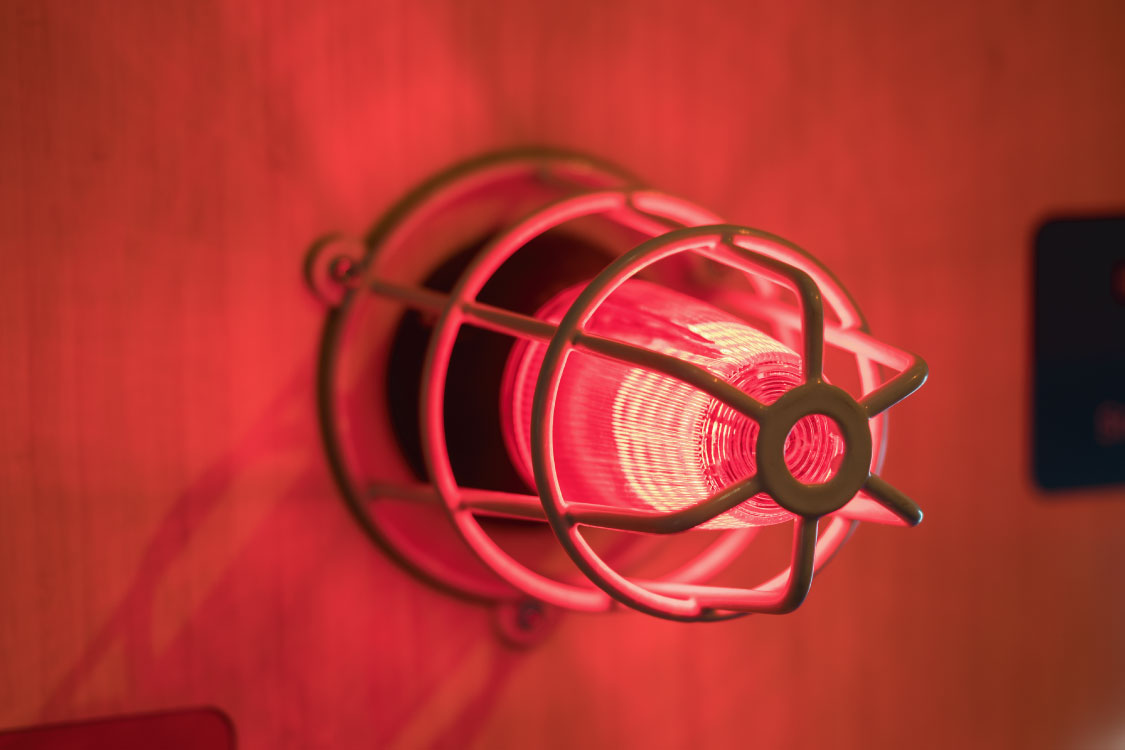29 June 2021
The Different Types of Fire Alarm
Fire alarms play an absolutely crucial role in keeping us safe. Even though we might not pay them much attention when they’re not in use, the unmistakable peace-shattering sound of a fire alarm has saved millions of lives around the world. They’re legally required in all business premises, but there are different types of fire alarms available, so the Fire & Security Group team is going to talk you through them here.

Conventional Fire Alarm Systems
Conventional systems are the most common type of fire alarm. As well as alerting people to the occurrence of a fire, a conventional fire alarm also directs people to the general location of the fire using a control panel. It doesn’t pinpoint a specific location like more advanced fire alarms do, but the functionality of a conventional fire alarm system means they are well-suited to smaller premises.
Conventional fire alarm systems are only available in wired formats, which means they’re not always ideal, especially if you’d like to preserve the clean, wire-free look of walls and ceilings. If there is just a single alarm point, then the installation is relatively simple but the more alarm points there are, the more complex the installation can become.
Wireless Fire Alarms
For larger buildings or buildings where cabling is unfeasible, wireless fire alarm systems are ideal. As the name suggests, wireless technology allows each alarm point to ‘communicate’ with one another and the central control panel. Due to the varying number of frequencies through which the alarms communicate, there is no danger of the signal – and therefore the system’s efficacy – being compromised.
Additionally, the lack of wires makes installation easier and quicker. With a wireless set up, any number of alarm points can be connected to the network, making it an ideal system for buildings with many rooms or multiple floors. The alarms and the control panel allow for easy location of the fire – a wireless alarm system is much more precise than its wired counterpart.
Monitored Fire Alarms
Monitored fire alarms provide an increased level of fire protection, as they ensure your premises remain protected even when they’re empty. These systems make use of Redcare technology – they’re supervised 24/7 by a dedicated response centre, which means the authorities, the owner of the property and all relevant key holders will be alerted to a fire immediately when the alarm sounds.
There is of course an extra expense for opting for alarm monitoring, but there’s no substitute for the level of efficacy and efficiency that it provides. Without alarm monitoring, a fire in an empty property could cause enormous destruction, only abating if the fire dies out naturally or if someone happens to hear the alarm and calls the fire brigade – by which time it could be much too late. Monitored fire alarms provide extra protection and extra peace of mind.
Radio Fire Alarm Systems
Radio fire alarm systems consist of multiple alarm points on the same radio frequency, which allows them to communicate with each other. When one alarm on the network is triggered, the other alarms sound at the same time to alert other people in the building to the situation. These types of alarms are particularly useful in large premises – if a fire breaks out in the kitchen of a hotel, for example, those in the staff room will be notified too.
Radio fire alarm systems are available as mains-connected or battery-powered versions. Battery-powered versions are ideal for people who don’t want wires for aesthetic reasons, or for properties where wiring would be particularly complex. However, even the mains-powered versions only require a single cable to the mains – the wires needn’t run between each alarm point.
VESDA ASD
VESDA refers to Very Early Smoke Detection Apparatus, and ASD stands for Aspirating Smoke Detector. These systems are some of the most advanced on the market, offering unparalleled levels of smoke and therefore fire detection.
VESDA systems work so well because they are constantly sampling the air for traces of smoke. They can detect even the tiniest element, meaning that they can alert people to a potential fire long before it becomes a serious issue. The presence of a VESDA system means that people can be evacuated, the potential fire can be neutralised and the authorities can be contacted all before the first flame appears.
Fire Alarm Installation
No matter the type of fire alarm you need, you can trust Fire & Security Group to install it. We’re trusted, skilled and experienced installers of wireless fire alarms, radio fire alarms, VESDA ASD systems, and we’re approved installers of BT’s Redcare-monitored fire alarms.
Whether you need a conventional fire alarm system for a small office space or a multi-point wireless fire alarm system for a large building, we deliver efficient, effective and professional installation. If you’re unsure as to the most suitable fire alarm system for your premises, our experts can advise you on the best choice before commissioning and installing a system perfectly designed for your building.
To find out more about our fire alarm systems and fire alarm installation services, simply contact Fire & Security Group today and we’ll be happy to help.

